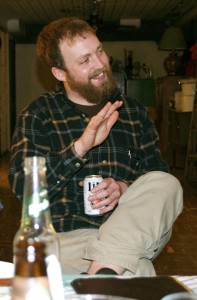On a Monday evening, ten Millennials and a Baby Boomer gathered in a church basement. It sounds like a bad joke, but the refurbished church basement was home to CURE staffer Sarina Otaibi, and the Millennials and Baby Boomer had come together for a pretty serious focus group on transitional leadership and social change. Seeking ultimately to understand what drives Millennials, the generation of people that will be between the ages of 14 and 33 in 2014, we explored such topics as Millennial views on government and politics at the national, state, and local levels; civic engagement; leadership; rural life; and social and professional networks.
We pulled this group together because CURE is a forward-looking, multi-generational organization, so we understand the need to take part in and prepare for the generational transition that will sweep our nation. Millennials, at 28% of the state’s population, are currently the largest generation, while the next largest group, the Baby Boomers, are approaching retirement age. This means that it will not be long before the reins of our region, state, and nation will be in the hands of Millennials, and, depending on who’s talking, this may be cause for celebration or concern. Based on our conversation Monday night, CURE sees both sides of the issue, but we are ultimately optimistic about the young leaders in our community.
 Millennials as Leaders
Millennials as Leaders
CURE defines a leader as someone who is able to effect positive change for the betterment of others. We believe that all people are potential leaders. So how will Millennials take on leadership? Based on our research, we believe Millennials will be more tolerant, collaborative, diverse, and connected, among other traits. We also see that Millennials will “make things work” with their style of engagement and leadership. Yet, the structure of leadership will look different as traditional organizations and institutions are reshaped by this generation.
Millennial Challenges
Becoming a young, rural leader does not come without its challenges. Most challenges discussed in the focus group were based on the geographic isolation of rural life. This challenge is more formidable for young adults today than for rural young adults of other generations because Millennials are markedly less likely to live in rural areas than older Americans were at comparable ages. On a national level, only 14% of Millennials live in rural areas, while 29% of Boomers and 36% of the Silent Generation did so at the same age. Therefore, finding like-minded people within their own age cohort is more difficult for the Millennials that have chosen to make a rural area home.
Recognizing that Millennials are known for their positive approach to challenges and ability to find opportunities and creative solutions, CURE also asked for a remedy. The answer? “We want connections and community.” How does an organization go about building connections and community? It applies the rules of network thinking.
Building a Network Hub
CURE wants to build a network hub for this generation that will equip them with the tools, connections, and training needed to overcome the challenges of rural isolation and create a successful network of people. When a Millennial decides to move back home to his or her small town or decides to move to a small town for a job or to raise a family, what are the avenues for engaging with his or her new community? CURE’s leadership network hub would be one of those avenues. By fostering person-to-person connectivity, utilizing network technology, and offering up an extensive menu of tools and trainings, a new generation of rural leaders will emerge. With new leaders come innovation, new ideas, and new opportunities.
Are the young people who are moving and choosing to live in western Minnesota embracing their leadership potential?
Based on our first gathering of Millennials, the answer is yes. With the right network model and leadership training, CURE believes we will be able to cultivate the positive energy of emerging rural leaders and that they will effect positive change for the betterment of others. There is great opportunity for Millennials to take on leadership roles in western Minnesota, and CURE looks forward to igniting the spark in these young, progressive, rural leaders.
Thank you to those who participated in our Millennial focus groups; CURE appreciated your time and input!



